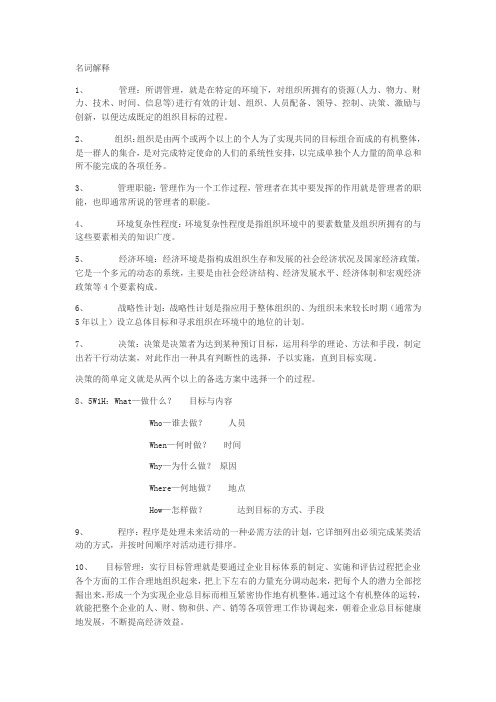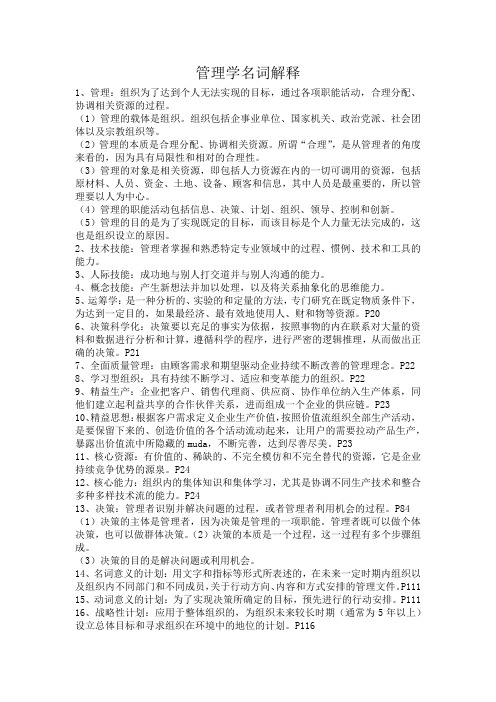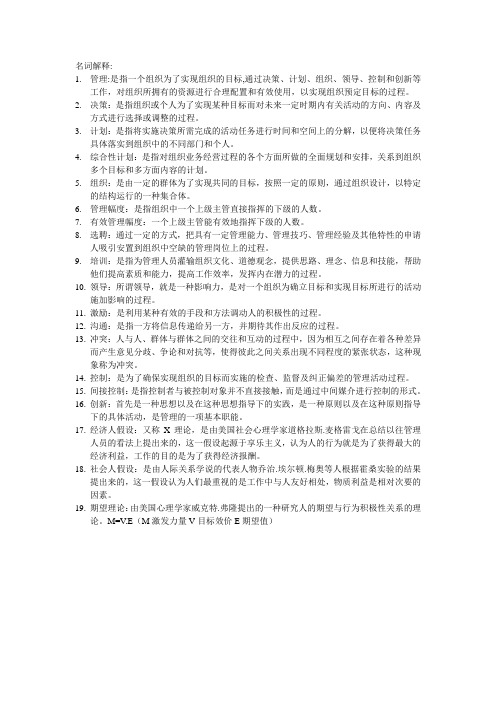管理学名词解释
管理学名词解释

名词解释1.行会:中古城市手工业者按照各自的行业结成的联盟,是城市手工业者保障自身利益的行业内部组织,它具有现代管理的某些雏形。
2.群体:群体的含义非常广泛,可以理解为后来的家庭、组织、工厂和国家。
其基本特征是:由人组成;有共同的基本目标;内部有组织,并且这个组织是为达到群体目标而客观存在的。
3.群氓假设:①社会由一群一群无组织的个人所组成;②每个人以一种计算利弊的方式为个人的利益而行动;每个人为达到这个目的,尽可能地合乎逻辑地思考和行动。
4.大工业:所谓大工业,首先必须理解为一种组织,一种生产制度或生产组织方式。
这种组织的建立影响着整个经济制度,从而影响整个社会制度。
5.经济人:又称理性人,是指个人的一切活动都受利己心的支配,人是个人利益的追求者。
6.工资规律:大卫·李嘉图提出,在资本和管理技术关系上存在所谓的工资规律,认为工人劳动创造的价值是工资、利润和地租的源泉,这是经营管理的核心问题。
并且工资的高低与利润的高低成反比。
7.市场伦理:由亚当·斯密提出,是资本主义精神来源之一。
认为只有市场与竞争才是经济活动的调节器,市场是一只看不见的手,能够保证资源得到最佳配置并发挥最大效能。
8.例外原则:是指企业的高级管理人员把一般日常事务授权给下属管理人员负责,而自己保留对例外事项一般也是重要事项的决策权和控制权。
9.甘特图:甘特图,是通过对生产日期和产量图示来控制计划和生产进行的一种日平衡图。
具有简单、醒目和便于编制等特点。
从图上可以了解计划的完成和进展情况,还可以对计划执行情况进行预测和调整。
10.职能工长制:泰勒的职能工长制是根据工人的具体操作过程来进一步对分工进行细化而形成的。
职能工长是根据事先规定好的工人的全部作业过程来指导工人干活的具有特殊素质的管理者。
11.时间研究原理:在动作分解欲作业分析的基础上进一步观察和分析工人完成每项动作所需要的时间,考虑到满足一些生理需要的时间和不可避免的事情而耽误的时间,为标准作业的方法而制定标准的作业时间,以便确定工人的劳动定额。
管理学名词解释

名词解释1、管理:所谓管理,就是在特定的环境下,对组织所拥有的资源(人力、物力、财力、技术、时间、信息等)进行有效的计划、组织、人员配备、领导、控制、决策、激励与创新,以便达成既定的组织目标的过程。
2、组织:组织是由两个或两个以上的个人为了实现共同的目标组合而成的有机整体,是一群人的集合,是对完成特定使命的人们的系统性安排,以完成单独个人力量的简单总和所不能完成的各项任务。
3、管理职能:管理作为一个工作过程,管理者在其中要发挥的作用就是管理者的职能,也即通常所说的管理者的职能。
4、环境复杂性程度:环境复杂性程度是指组织环境中的要素数量及组织所拥有的与这些要素相关的知识广度。
5、经济环境:经济环境是指构成组织生存和发展的社会经济状况及国家经济政策,它是一个多元的动态的系统,主要是由社会经济结构、经济发展水平、经济体制和宏观经济政策等4个要素构成。
6、战略性计划:战略性计划是指应用于整体组织的、为组织未来较长时期(通常为5年以上)设立总体目标和寻求组织在环境中的地位的计划。
7、决策:决策是决策者为达到某种预订目标,运用科学的理论、方法和手段,制定出若干行动法案,对此作出一种具有判断性的选择,予以实施,直到目标实现。
决策的简单定义就是从两个以上的备选方案中选择一个的过程。
8、5W1H:What—做什么?目标与内容Who—谁去做?人员When—何时做?时间Why—为什么做?原因Where—何地做?地点How—怎样做?达到目标的方式、手段9、程序:程序是处理未来活动的一种必需方法的计划,它详细列出必须完成某类活动的方式,并按时间顺序对活动进行排序。
10、目标管理:实行目标管理就是要通过企业目标体系的制定、实施和评估过程把企业各个方面的工作合理地组织起来,把上下左右的力量充分调动起来,把每个人的潜力全部挖掘出来,形成一个为实现企业总目标而相互紧密协作地有机整体。
通过这个有机整体的运转,就能把整个企业的人、财、物和供、产、销等各项管理工作协调起来,朝着企业总目标健康地发展,不断提高经济效益。
管理学名词解释

名词解释1、社会人假设:“社会人”假设认为,人除了有经济上的需求外,还有友谊、受人尊重等社会因素方面的需求,社会性需求的满足比经济报酬更能激励人们。
2、网络组织结构:是一种“外部化”的组织结构,它只有很小的中心组织,并依靠其他组织以合同为基础进行制造、销售等等业务。
3、学习型组织:所谓学习型组织,就是充分发挥每个员工的创造性的能力,努力形成一种弥漫于群体与组织的学习气氛,凭借着学习,个体价值得到体现,组织绩效得以大幅度提高。
4、影响力:领导是一种影响力,是对人们施加影响的艺术或过程,从而使人们情愿地,真心地为实现组织或群体的目标而努力。
5、决策方式:决策者在决策制定过程中组合运用各种资源的方式。
6、结构性维度:描述组织的内部特征状态的参数。
7、决策树:是用二叉树形图来表示处理逻辑的一种工具。
8、网络计划方法:网络计划方法,是把一个工程项目分解成若干作业(或称活动),然后根据作业的先后顺序、逻辑关系进行统筹安排,合理规划,分别轻重缓急,从而对项目整体进行控制和调节,更好地监控项目的进度,发现可能的瓶颈环节,以及必要时调度资源确保项目按计划进行。
9、前馈控制:是指通过观察情况、收集整理信息、掌握规律、预测趋势,正确预计未来可能出现的问题,提前采取措施,将可能发生的偏差消除在萌芽状态中,为避免在未来不同发展阶段可能出现的问题而事先采取的措施。
10、决策方式体系:决策方式体是由以下三方面构成:1)明确区分组织运行过程中的决策问题类型;2)指明各种问题的具体决策责任人;3)规定决策责任人在进行决策时所采用的决策方式。
11、管理人假设:遵循令人满意准则进行经济活动的主体。
12、事业部结构组织:称为产品部式结构或战略经营单位。
即按产品或地区设立事业部或大的子公司,每个事业部都有自己较完整的职能机构。
13、管理幅度:又称管理宽度,是指在一个组织结构中,管理人员所能直接管理或控制的部属数目。
14、职权:职权是由于处于更高层次的管理者的授权而获得的(需要一定的程序)——权力链。
管理学名词解释

三.名词解释1.管理:是管理者为有效地达到组织目标,对组织资源和组织活动有意识、有组织、不断地进行的协调活动。
2.行为科学:广义的行为科学是指包括类似运用自然科学的实验和观察方法,研究在自然和社会环境中人的行为的科学。
狭义的行为科学是指有关对工作环境中个人和群体的行为的一门综合性学科。
3.企业文化:是指一定历史条件下,企业在生产经营和管理活动中所创造的具有本企业特色的精神财富及其物质形态。
4.战略管理:就是根据对企业经营条件和外部环境的分析,确定企业总的经营宗旨和经营目标,并且制定一种或几种有效的战略,使企业达到经营宗旨和经营目标所采取的一系列管理决策和行动。
5.计划工作:有广义和狭义之分。
广义的计划工作,是指制定计划、执行计划和检查计划三个阶段的工作过程。
狭义的计划工作,是指制定计划,即根据组织内外部的实际情况,权衡客观的需要和主观的可能,通过科学的预测,提出在未来一定时期内组织所需达到的具体目标以及实现目标的方法。
6.企业目标:是在分析企业外部环境和内部条件的基础上确定的企业各项经济活动的发展方向和奋斗目标,是企业经营思想的具体化。
7.目标管理:是一个全面的管理系统。
它用系统的方法,使许多关键管理活动结合起来,高效率地实现个人目标和企业目标。
具体而言,它是一种通过科学地制定目标、实施目标,依据目标进行考核评价来实施管理任务的管理方法。
8.决策:就是指为了达到一定的目标,从两个以上的可行方案中选择一个合理方案的分析判断过程。
9.企业组织结构:是企业全体职工为实现企业目标,在管理工作中进行分工协作,在职务范围、责任、权利方面所形成的结构体系。
10.人员配备:是组织根据目标和任务正确选择、合理使用、科学考评和培训人员,以合适的人员去完成组织结构中规定的各项任务,从而保证整个组织目标和各项任务完成的职能活动。
11.管理层次与管理幅度:管理层次是指一个组织设立的行政等级的数目。
管理幅度是指一个主管能够直接有效地指挥下属成员的数目。
【管理学】名词解释

1、管理:指社会组织中,为了就实现预期的目标,以人为中心进行的协调活动。
(1)现代管理理论的创始人法国实业家法约尔1916年提出,管理是由计划、组织、只会、协调及控制等职能为要素组成的活动过程。
(2)1978年诺贝尔经济学奖获得者赫伯特·西蒙提出管理就是决策。
2、管理的职能:指管理者在管理过程中所从事的各种活动和发挥的作用。
3、计划:指制定目标并确定为达成这些目标多必须的行动。
4、领导:指指挥、带领、引导和孤立部下为实现目标而努力的过程。
5、控制:为保证企业计划与实际作业动态适应的管理过程。
6、创新:是一种思想及在这种思想指导下的实践,是一种原则以及在这种原则指导下的具体的活动。
是管理的一种基本职能。
7、管理者的职能:指作为一般的管理者,它在组织体系内从事各种活动的立场,行为表现等特征及归纳。
8、技术职能:指运用管理者所监督的专业领域中的过程,惯例、技术和工具的能力。
9、人际技能:指成功地与别人打交道并与别人沟通的能力。
10、概念技能:指把观点设想出来并加以处理以及将关系抽象化的精神能力。
11、行为科学:指利用许多学科的知识来研究人们行为的产生、发展、变化的规律,从预测、控制和领导人的行为、达到充分发挥、调动人的积极性的目的。
12、霍桑试验:指梅奥参加1927年至1932年在芝加哥西方电气公司霍桑工厂进行的试验工作。
目的是找出工作条件对生产效率的影响,以寻求体噶劳动生产率的途径。
13、士气:指工作积极性、主动性、协作精神等合成一体的精神状态。
14、正式组织:指企业体系中的环节,是指为了视线企业总目标而担当着明确职能的机构。
15、非正式组织:企业职工在共同工作、共同生产相互之间的人群关系,产生共同的感情,形成一种行为准则或惯例,要求个人服从,这就构成了“非正式组织”。
16、统一命令:指一个员工在任何活动中只应接受一位上级的命令。
17、统一领导:指为达到同一目的而进行的各种活动,应由以为首脑根据一项计划开展。
管理学名词解释大全

管理学名词解释大全1. 经营管理:指企业或组织对资源的整合和利用,以实现既定目标并增加价值的活动。
2. 组织管理:指对企业或组织内部各项工作进行规划、协调、控制和领导的活动。
3. 制度管理:指依照特定的规则和程序进行组织和管理的活动。
4. 人力资源管理:指对企业或组织内部人力资源进行招聘、培训、激励和离职的活动。
5. 资产管理:指对企业或组织的资产进行规划、配置、评估和优化的活动。
6. 运营管理:指企业或组织对生产、供应链和服务等运营活动的规划、协调和控制。
7. 财务管理:指企业或组织对财务资源进行规划、决策和控制的活动。
8. 市场营销:指企业或组织通过市场调研、产品开发、价格制定和推广销售等活动,满足客户需求并获取利润的过程。
9.战略管理:指企业或组织确定长期目标,规划资源配置和组织发展的活动。
10. 目标管理:指企业或组织根据自身使命和愿景确定具体目标,并设计相应的实施计划和评估方法。
11. 绩效管理:指对组织的绩效进行制定、优化和评估的活动。
12. 领导管理:指领导者对组织内部员工进行激励、指导和管理的活动。
13. 项目管理:指对特定项目进行规划、组织、协调和控制的活动。
14. 创新管理:指企业或组织通过开展创新活动,提高核心竞争力和可持续发展能力。
15. 风险管理:指对企业或组织内部和外部风险进行识别、评估、控制和应对的活动。
16. 变革管理:指对组织进行重大变革时的规划、执行和监控活动。
17. 品质管理:指对产品或服务的品质进行保证和持续改进的活动。
18. 知识管理:指对企业或组织内部知识的获取、共享、存储和应用的活动。
19. 运筹学:指运用数学和逻辑方法对生产、运输、库存和资源配置等问题进行优化的学科。
20. 外包管理:指企业或组织将非核心业务外包给专业服务提供商进行管理。
21. 策略管理:指管理者对企业或组织的战略进行制定、执行和评估的活动。
22. 合规管理:指企业或组织遵守法规和道德规范,进行合法经营和社会责任的活动。
管理学名词解释

管理学名词解释1、管理:就是在特定旳环境下,对组织所拥有旳资源进行有效旳计划、组织、领导和控制,以便达到既定旳组织目旳旳过程。
2、高层管理人员:是指对整个组织旳管理负有全面责任旳人,他们旳重要职责是制定组织旳总目旳、总战略,掌握组织旳大体方针,并评价整个组织旳绩效。
3、中层管理人员:是指处在高层管理人员和基层管理人员之间旳一种或若干个中间层次旳管理人员,他们旳重要职责是,贯彻执行高层管理人员所制定旳重大决策,监督和协调基层管理人员旳工作。
4、基层管理人员:亦称第一线管理人员,也就是组织中处在最低层次旳管理者,他们所管辖旳仅仅是作业人员而不波及其他管理者。
他们旳重要职责是,给下属作业人员分派具体工作任务,直接指挥和监督现场作业活动,保证各项任务旳有效完毕。
5、综合管理人员:指负责管理整个组织或组织中某个事业部旳所有活动旳管理者,涉及总经理和每个产品或地辨别部旳经理。
6、专业管理人员:指仅仅负责管理组织中某一类活动(或职能)旳管理者。
7、技术技能:指使用某一专业领域内有关旳工作程序、技术和知识完毕组织任务旳能力。
8、人际技能:指与解决人事关系有关旳技能,即理解、鼓励别人并与别人共事旳能力。
9、概念技能:是指综观全局、认清为什么要做某事旳能力,也就是洞察公司与环境互相影响之复杂性旳能力。
具体地说,概念技能涉及理解事物旳互相关联性从而找出核心影响因素旳能力,拟定和协调各方面关系旳能力以及权衡不同方案优劣和内在风险旳能力,等等。
10、管理人员:是从事所有或部分管理工作旳人旳总称。
11、等级链:组织机构由最高层到最基层所形成旳层次构造,这一构造事实上是一条权力线,它是自上而正和自下而上保证信息传递旳必经途径。
12、跳板原则:在一定条件下,容许跨越权力线而直接进行旳横向沟通,可以克服由于统一指挥而产生旳信息传递延误。
13、马斯洛旳需求层次理论:马斯洛提出旳需要层次理论将人类旳多种需要提成五种不同旳需要,并按其优先顺序,排成阶梯式旳需要层次:自我实现旳需要、自尊旳需要、社会旳需要、安全旳需要和生理旳需要。
管理学名词解释

管理:是指组织为了达到个人无法实现的目标,通过各项职能活动,合理分配、协调相关资源的过程。
技术技能:指管理者掌握和熟悉特定专业领域中的过程、惯例、技术和工具的能力。
人际技能:指成功地与别人打交道并与别人沟通的能力。
概念技能:指产生新想法并加以处理,以与将关系抽象化的思维能力。
古典管理理论:是以“经济人”假设为基础的管理理论,强调运用经济刺激手段来调动工人的积极性,以提高劳动生产率。
差别计件工资制:是指计件工资率随完成定额的程度而上下浮动的制度。
甘特图:一种用线条表示的计划图.数量管理理论:以现代自然科学的成果为手段,运用数学模型,对管理领域中的人、财、物和信息资源进行系统的定量分析,并做出最优规化和决策。
系统管理理论:指运用系统理论中的X畴、原理,对组织中的管理活动和管理过程,特别是组织结构和模式进行分析的理论。
决策科学化:是指决策要以充足的事实为依据,按照事物的内在联系对大量的资料和数据进行分析和计算,遵循科学的程序,进行严密的逻辑推理,从而做出正确决策。
权变管理理论:力图研究组织与环境的联系,并确定各种变量的关系类型。
它强调管理要根据组织所处的环境随机应变,针对不同环境寻求相应的管理模式。
全面质量管理理论:是由顾客需求和期望驱动企业持续不断改善的管理理念。
核心资源:是指有价值的、稀缺的、不完全模仿和不完全替代的资源,它是企业持续竞争优势的源泉。
核心能力:是组织内的集体知识和集体学习,尤其是协调不同生产技术和整合多种多样技术流的能力。
2013学习型组织:是指具有持续不断学习、适应和变革能力的组织。
2014个人特征:指管理者的个人价值观、自信心和自控力。
.道德:通常是指那些用来明辨是非的规则或原则。
道德准则:是表明组织的基本价值观和组织期望员工遵守的道德规则的正式文件。
功利主义道德观:认为行为影响所与的大多数人带来最大利益的行为才是善的。
权力至上道德观:认为尊重和保护个人基本权利的行为才是善的。
管理学名词解释

管理学名词解释1、管理:组织为了达到个人无法实现的目标,通过各项职能活动,合理分配、协调相关资源的过程。
(1)管理的载体是组织。
组织包括企事业单位、国家机关、政治党派、社会团体以及宗教组织等。
(2)管理的本质是合理分配、协调相关资源。
所谓“合理”,是从管理者的角度来看的,因为具有局限性和相对的合理性。
(3)管理的对象是相关资源,即包括人力资源在内的一切可调用的资源,包括原材料、人员、资金、土地、设备、顾客和信息,其中人员是最重要的,所以管理要以人为中心。
(4)管理的职能活动包括信息、决策、计划、组织、领导、控制和创新。
(5)管理的目的是为了实现既定的目标,而该目标是个人力量无法完成的,这也是组织设立的原因。
2、技术技能:管理者掌握和熟悉特定专业领域中的过程、惯例、技术和工具的能力。
3、人际技能:成功地与别人打交道并与别人沟通的能力。
4、概念技能:产生新想法并加以处理,以及将关系抽象化的思维能力。
5、运筹学:是一种分析的、实验的和定量的方法,专门研究在既定物质条件下,为达到一定目的,如果最经济、最有效地使用人、财和物等资源。
P206、决策科学化:决策要以充足的事实为依据,按照事物的内在联系对大量的资料和数据进行分析和计算,遵循科学的程序,进行严密的逻辑推理,从而做出正确的决策。
P217、全面质量管理:由顾客需求和期望驱动企业持续不断改善的管理理念。
P228、学习型组织:具有持续不断学习、适应和变革能力的组织。
P229、精益生产:企业把客户、销售代理商、供应商、协作单位纳入生产体系,同他们建立起利益共享的合作伙伴关系,进而组成一个企业的供应链。
P2310、精益思想:根据客户需求定义企业生产价值,按照价值流组织全部生产活动,是要保留下来的、创造价值的各个活动流动起来,让用户的需要拉动产品生产,暴露出价值流中所隐藏的muda,不断完善,达到尽善尽美。
P2311、核心资源:有价值的、稀缺的、不完全模仿和不完全替代的资源,它是企业持续竞争优势的源泉。
管理学名词解释大全

名词解释:1.管理:是指一个组织为了实现组织的目标,通过决策、计划、组织、领导、控制和创新等工作,对组织所拥有的资源进行合理配置和有效使用,以实现组织预定目标的过程。
2.决策:是指组织或个人为了实现某种目标而对未来一定时期内有关活动的方向、内容及方式进行选择或调整的过程。
3.计划:是指将实施决策所需完成的活动任务进行时间和空间上的分解,以便将决策任务具体落实到组织中的不同部门和个人。
4.综合性计划:是指对组织业务经营过程的各个方面所做的全面规划和安排,关系到组织多个目标和多方面内容的计划。
5.组织:是由一定的群体为了实现共同的目标,按照一定的原则,通过组织设计,以特定的结构运行的一种集合体。
6.管理幅度:是指组织中一个上级主管直接指挥的下级的人数。
7.有效管理幅度:一个上级主管能有效地指挥下级的人数。
8.选聘:通过一定的方式,把具有一定管理能力、管理技巧、管理经验及其他特性的申请人吸引安置到组织中空缺的管理岗位上的过程。
9.培训:是指为管理人员灌输组织文化、道德观念,提供思路、理念、信息和技能,帮助他们提高素质和能力,提高工作效率,发挥内在潜力的过程。
10.领导:所谓领导,就是一种影响力,是对一个组织为确立目标和实现目标所进行的活动施加影响的过程。
11.激励:是利用某种有效的手段和方法调动人的积极性的过程。
12.沟通:是指一方将信息传递给另一方,并期待其作出反应的过程。
13.冲突:人与人、群体与群体之间的交往和互动的过程中,因为相互之间存在着各种差异而产生意见分歧、争论和对抗等,使得彼此之间关系出现不同程度的紧张状态,这种现象称为冲突。
14.控制:是为了确保实现组织的目标而实施的检查、监督及纠正偏差的管理活动过程。
15.间接控制:是指控制者与被控制对象并不直接接触,而是通过中间媒介进行控制的形式。
16.创新:首先是一种思想以及在这种思想指导下的实践,是一种原则以及在这种原则指导下的具体活动,是管理的一项基本职能。
管理学名词解释(必背!)

名词解释管理:管理者为了有效地实现组织目标、个人发展和社会责任,运用管理职能进行协调的过程。
(p11)自然属性:并不以人的意志为转移,也不因社会制度和意识形态的不同所改变,是一种客观存在。
(p17)社会属性:实质是“为谁管理”的问题,是为国家当局、为生产资料所有者服务的,是一定社会生产关系的反映。
(p17)人际技能(人际关系技能):是指成功的与别人打交道并与别人沟通的能力。
(p24)概念技能:是指把观点设想出来并加以处理以及将关系抽象化的精神能力。
(p25)等级链:从最上级到最下级各层权力连成的等级机构。
(p62)正式组织:是指企业组织体系中的环节,是指为了实现企业总目标而担当着明确职能的机构。
(p69)非正式组织:企业职工在共同工作、共同生产中,必然产生相互之间的人群关系,产生共同的感情,自然形成一种行为准则或惯例,要求个人服从。
(p69)程序性决策:即按即定的程序所进行的决策。
对于经常发生的需要决策的问题,往往可指定一个例行程序,凡遇到这一类问题,就按照既定程序进行的决策。
(p81)非程序性决策:问题涉及面广、新发生的、非结构性的,或者问题极为重要而复杂,没有程序可以遵循,要进行特殊处理的决策。
(p82)原理:指某种客观事物的实质及运动的基本规律。
(p107)管理原理:是对管理工作的实质内容进行科学分析总结而形成的基本真理。
(p107)系统:是指若干相互联系、相互作用的部分组成,在一定环境中具有特定功能的有机整体。
(p111)效益:是与效果和效率既相互联系、又相互区别的概念。
(p127)效果:是指投入经过转换而产出的成果,其中有的是有效益的,有的是无效益的。
(p127)效率:是指单位时间内所取得的效果的数量,反映了劳动时间的利用状况,与效益有一定的关系。
(p127)信息:是数据经过加工处理后得到的结果,并通过进一步分析,赋予相关情境的内涵而成为管理决策的依据知识。
(p132)信息化:是一种过程,指现代信息技术的应用,促成对象或领域发生转变的过程;也是一种状态,指对象或领域因信息技术的应用所达成的新状态或状态。
管理学名词解释

名词解释:1.管理:在特定环境下,整合组织的内外可利用的资源,通过计划与决策,组织、领导、控制和创新调动他人的力量,实现个人无法实现的组织目标的过程。
包括一下含义:①管理隐藏在所有的理论和工具之下,隐藏在所有的专业知识之下。
②管理具有一定的目的性,是有目的的一系列活动③管理依赖于一定的环境。
④管理活动要通过综合运用组织中的各种资源来实现组织的目标。
⑤管理是由一系列相互关联的职能构成。
⑥管理要达到的效果是个人无法达到的,而通过组织力量整合可以达到的“1+1>2”的效果。
2.管理学:管理学是系统研究管理活动的基本规律和一般方法的科学。
管理学是适应现代社会化大生产的需要产生的,它的目的是:研究在现有的条件下,如何通过合理的组织和配置人、财、物等因素,提高生产力的水平。
管理学是一门综合性的交叉学科。
3.管理者:管理者就是组织中促成他人努力工作,并对他人工作负责,通过他人并同他人一道实现组织目标的人。
其从事管理工作,负有领导指挥和协调下级成员去完成组织目标的人员。
管理者是以执行管理过程为主要职责的人。
管理者是履行规划与决策、组织、领导和控制的人。
应强调责任。
1.效率:投入和产出之间的关系,是指某一特定系统所消耗的能量所收获效果的比率,是实施管理后所得的收益和管理成本之间的比率,也是反映劳动时间的利用状况。
2.效果:由投入经过转换而产出的有用成果,指人们在社会实践活动中通过某种行为、力量、方式、或因素而产生的结果。
3.管理环境:影响一个组织生存和发展的各种外部因素和内部条件的总和。
4.宏观环境(一般环境):在一定时空内存在于社会中的各类组织均会面对的环境,归纳为政治和法律、社会和文化、经济、技术、自然与国际环境五个方面。
5.微观环境(特定环境):对组织经营产生直接影响的外部环境因素。
包括供应商、顾客、竞争者、其他特殊环境因素等。
6.SWOT综合分析:通过研究环境,认识外界的变化可能对组织造成的威胁或提供的发展机会,同时分析企业自身的资源和能力上的优势和劣势,由此两方面的结合制定出企业生存和发展方向战略。
管理学常见名词解释

管理学常见名词解释1.管理:是管理者为有效地达到组织目标,对组织资源和组织活动有意识、有组织、不断地进行的协调活动。
2.外部环境:民族文化传统、社会政治制度、经济制度和科学技术便成为影响管理活动的外部环境.3.管理职能:即是管理的职责的权限。
管理职能有一般职能和具体职能之分。
4.决策:指人们为了实现某一特定系统的目标,在占有信息的经验的基础上,根据客观的条件,提出各种备选的行动方案,借助科学的理论和方法,进行必要的计算、分析和判断,从中选择出一个最满意的方案,以之作为目前和今后的行动指南。
5.协调:即和谐,指企业的一切工作都能配合得适当,以便于工作使企业的经营活动顺利进行,并有利于企业取得成功。
6.组织的效率:指组织活动达到组织目标的有效性。
;1.霍桑试验:分为四个阶段:1)工厂照明试验;2)继电器装配试验;3)谈话研究;4)观察试验。
:2.行为科学:广义的行为科学是指包括类似运用自然科学的实验和观察方法,研究在自然和寒舍环境中人的千米的科学。
狭义的行为科学是指有关对工作环境中个人和群体的行为的一门综合性学科。
组织行为学:主要包括领导理论和组织变革、组织发展理论。
4.企业再造:企业再造的实施方法是以先进的信息系统和信息技术为手段,以顾客中长期需要为目标,通过最大限度地减少产品的质量和生产规模发生质的变化。
5.管理理论的丛林:理论和学派在历史源渊和内容上相互影响的相互联系,形成了盘根错节、争相竞荣的局面,被称为"管理理论的丛林"。
6.案例教学:经验学派所谓的经验实质上是传授管理学知识的一种方法,称为“案例教学”。
7.企业文化:企业在长期的生产经营和管理活动中创造的具有本企业特色的精神文化和物质文化。
管理学必备名词解释47个

管理学必备名词解释47个管理学常考名词解释47个名词解释1.管理:是指组织中的管理者,通过实施计划,组织,⼈员配备,领导,控制等职能来协调他⼈的活动,使他⼈同⾃⼰⼀起实现既定⽬标的活动过程。
2.管理学:是⼀门系统地研究管理过程的普遍规律,基本原理和⼀般⽅法的科学。
3.系统:是指由相互作⽤和相互依赖的若⼲组成部份结合⽽成的,具有特定功能的有机整体,系统本⾝⼜是它从属的⼀个更⼤的系统的组成部份。
4.霍桑试验: 1924-1932年间,美国国家研究委员会和西⽅电⽓公司合作进⾏了⼀项研究。
由于研究是在西⽅电⽓公司的霍桑⼯⼚进⾏的,因此后⼈称之为霍桑试验。
分为:⼯场照明试验;继电器装配室试验;⼤规模的访问和普查;电话线圈装配⼯试验。
5.管理理论丛林:第⼆次世界⼤战以后,随着现代⾃然科学技术和⽣产⼒的迅速发展,引起了⼈们对管理理论的普遍重视并从各⾃所处的⾓度,结合⾃⼰本专业的知识去研究现代管理问题,形成了多种管理学派。
美国管理学家孔茨把管理理论的各个流派称之为"管理理论丛林".6.战略管理:是组织制定和实施战略的活动过程,其核⼼问题是确保组织的⾃⾝条件与外部环境相适应,求得组织长期稳定的发展。
7.全⾯质量管理TQM:⼀个组织以质量为中⼼,以全员参与为基础,⽬的在于通过让顾客满意和本组织所有成员及社会受益⽽达到长期成功的管理途径。
8.环境的不确定性:是指组织环境的复杂程度和变化程度。
9.社会责任:是指组织在遵守,维护和改善社会秩序,保护增加社会福利等⽅⾯所承担的职责和义务。
10.计划⼯作:是指制定计划,就是根据组织内外部的实际情况,权衡客观需要的主观可能,通过科学地预测,提出在未来⼀定时期内组织所要达到的⽬标以及实现⽬标的⽅法。
11.许诺原理:是指任何⼀项计划都是对完成某项⼯作所能做出的许诺,许诺越⼤,所需的时间越长,因⽽实现⽬标的可能性越⼩。
12.⽬标:是根据组织的使命⽽提出的组织在⼀定时期内所要达到的预期成果。
管理学(名词解释)

名词解释1.管理环境:指实施管理过程中各种内外部条件和因素的总和。
2.管理者:就是管理主体,是管理系统中最核心,最关键的要素,是整个管理系统的驾驭者3.管理:通过计划、组织、领导和控制,协调以人为中心的组织资源与职能活动,以有效实现目标的社会活动4.管理机制:指管理系统的结构及其运行机理。
5.管理系统:指由相互联系,相互作用的若干要素和子系统,按照管理的整体功能和目标结合而成的有机整体6.管理环境:指存在于社会组织内部与外部的影响管理实施和管理效果的各种力量、条件和因素的总和7.管理者:指履行管理职能,对实现组织目标负有贡献责任,并对目标达成发挥实际影响力的人。
8.例外原则:企业的高级管理人员吧例行的一般日常事务授权给下级管理人员去处理,自己只保留对例外事项的确定权和监督权。
9.组织结构:指在工作分工和职责划分基础上形成的,由横向、纵向的部门、层次、职位等要素所构成的网络关系体系。
10.系统原理:坚持用系统的观点与方法分析解决管理问题,形成整体解决方案,以实现管理系统最优化目标11.企业再造:12.人本原理:坚持以人为根本的现代理念,所有管理活动与行为必须以人为中心,人既是管理成功的关键,又是成功管理的终极目的。
13.组织文化指在一定的社会政治、经济、文化背景条件下,组织在社会实践过程中所创造并逐步形成的,独具特色的,并被组织成员广为接受的思维方式,道德作风,价值观念,和行为准则。
14.非正式组织:并不是由正式组织所建立或所需要的,而是由于人们相互联系而自发形成的个人和社会关系的网络15.滚动计划法:每次编制修订计划时,要根据前期计划执行情况和客观条件变化,将计划期向未来延伸一段时间,使计划不断地向前滚动延伸16.目标管理:是一个全面的管理系统分,它用系统的方法,使许多关键管理活动结合起来,有意识地瞄准组织目标和个人目标,并有效地和高效率地实现他们。
17.计划职能:广义:指管理者制定计划、执行计划、检查计划执行情况的全过程。
管理学名词解释

管理的普遍性:指在所有类型和规模的组织中,在组织的所有层级和工作领域,在全球的所有地方,管理者都是不可或缺的。
官僚行政组织:韦伯提出的一种以劳动分工、定义清晰的等级制度、明确的规章制度和非个人关系为特征的组织形式,目的是将之作为一种基础,以便于研究工作如何能够在大型组织中得以实现。
全面质量管理:是一种管理哲学,致力于持续改进和对顾客的需求和期望做出应对。
组织文化:组织成员共有的并且能影响其行为方式的价值观、传统、原则和做事方式。
它是一种感知,具有描述性和共享性。
强文化:其核心价值观被组织成员广泛坚持和认同,对管理者进行计划、组织、控制和领导的方式影响很大的组织文化。
利益相关者:组织外部环境中被组织决策和行动所影响的任何相关者,包括内部群体和外部群体,这两种群体都能够影响组织的行动和运营方式。
职场精神:是一种文化,在这种文化中,组织的价值观提倡员工通过在集体环境中从事有意义的工作来获得对目的的感知。
因为拥有职场精神文化的组织认识到,人拥有灵魂和意识,试图在他们的工作中寻找意义和目的,渴望与他人发生联系并成为组织的一部分。
环境的不确定性:描述组织外部环境的变化程度和复杂程度。
理性决策:运用符合逻辑的、前后一致的选择以实现价值最大化。
它的假设如下:问题是明确的;目标是清晰的;所有的方案和后果是已知的;最后的选择会使利益最大化。
承诺升级:指管理者越来越认同以前所做的某项决策,即便有证据显示该决策是错误的。
循证管理:是指“系统地使用可获得的最佳证据来改进管理行为和实践”。
其假设前提是“通过使用可靠的、密切相关的证据,任何决策制定过程都可能因此获得改进。
”其基本要素包括决策者的专长和判断;决策者予以评估的外部证据;该决策的利益相关者的意见、偏好和价值观;相关的组织因素。
程序化决策:即通过某种例行办法做出的重复性决策。
主要有三种类型:程序、规定、政策。
高可靠性组织:即可以辨别突发状况并且迅速适应新环境的组织。
管理学名词解释

管理学名词解释
什么是管理学?
管理学是一门研究组织与管理的学科,通过研究管理的理论和
实践,帮助人们更好地理解和应对组织中的问题。
它涉及到组织结构、领导力、决策制定、人力资源管理等方面。
组织结构
组织结构是指一个组织中各个成员之间的关系和职责划分。
它
决定了权力和信息在组织内部的流动方式,可以是分工明确的等级
制度,也可以是更为灵活的平级网络。
领导力
领导力是指个人在组织中影响他人并推动实现共同目标的能力。
一个有效的领导应具备愿景、激励他人、解决冲突和做出决策的能力。
决策制定
决策制定是指在面对选择时,做出最优解的过程。
它涉及到信息收集、分析、评估不同选项和权衡利弊。
决策通常需要考虑因素如风险、可行性和效益。
人力资源管理
人力资源管理是指组织对员工进行招聘、培训、激励、绩效评估和福利管理等方面的活动。
它旨在最大程度地发挥员工的潜力,提高组织的绩效和竞争力。
总结
管理学是一个广泛的学科,涵盖了组织结构、领导力、决策制定和人力资源管理等方面。
通过研究和实践,我们可以提升个人和组织的管理能力,进一步推动组织的发展和成功。
- 1、下载文档前请自行甄别文档内容的完整性,平台不提供额外的编辑、内容补充、找答案等附加服务。
- 2、"仅部分预览"的文档,不可在线预览部分如存在完整性等问题,可反馈申请退款(可完整预览的文档不适用该条件!)。
- 3、如文档侵犯您的权益,请联系客服反馈,我们会尽快为您处理(人工客服工作时间:9:00-18:30)。
第一单元Manager:Someone who coordinates and oversees the work of other people so that organizational goals can be accomplished管理者:通过协调和监管其他人的工作活动以实现组织目标的人员First-line Managers:Individuals who manage the work of non-managerial employees.Middle Managers:Individuals who manage the work of first-line managers. Top Managers:Individuals who are responsible for making organization-wide decisions and establishing plans and goals that affect the entire organization.基层管理者:最底层的管理人员,他们管理着非管理雇员所从事的工作。
中层管理者:对基层管理者进行管理的人员。
高层管理者:负责为整个组织制定决策、计划和目标并进而影响整个组织的管理人员。
Management:coordinating and overseeing the work activities of others so that their activities are completed efficiently and effectively.管理:协调和监管他人的工作活动,从而使其有效率、有效果地完成工作。
Efficiency: Doing things right,or Getting the most output for the least inputs 效率:正确地做事,或者以尽可能少的投入获得尽可能多的产出Effectiveness: Doing the right things,or Attaining organizational goals 效果:做正确的事情,或者实现组织的目标Planning:management function that involves setting goals, establishing strategies for achieving those goals, and developing plans to integrate and coordinate activities.Organizing: management function that involves arranging and structuring work to accomplish organizational goals.Leading : management function that involves working with and through people toaccomplish organizational goals.Controlling: management function that involves monitoring, comparing, and correcting work performance计划:设定目标,确定实现这些目标的战略,并且制定计划以整合和协调各种活动组织:安排各项工作,以实现组织目标领导:同他人合作并通过他人去实现目标控制:对员工的工作进行监控、比较和纠正Management Roles: specific actions or behaviors expected of a manager. Interpersonal roles: managerial roles that involve people and other duties that are ceremonial and symbolic in nature.Informational roles: managerial roles that involve collecting,receiving,and disseminating information.Decisional roles: managerial roles that revolve around making choices.管理角色:管理者按照人们的预期在实践中展示的具体行为或表现人际关系角色:人与人的关系以及其他礼仪性的和象征性的职责。
信息传递角色:收集、接受和传播信息决策制定角色:作出决策和选择Technical skills:job-specific knowledge and techniques needed to proficiency perform work tasks.Human skills:The ability to work well with other people individually and in a group.Conceptual skills:The ability to think and to conceptualize about abstract and complex situations技术技能:某个特定领域的知识和专业技术人际技能:与他人和睦相处、密切配合的能力概念技能:对组织面临的抽象、复杂情况进行思考和概念化的能力Organization:A deliberate arrangement of people assembled to accomplish some specific purpose组织:是对人员的一种精心安排,以实现某个特定目的。
(这个目的是个体无法单独实现的)Sustainability:a company’s ability to achieve its business goals and increase long-term shareholder value by integrating economic, environmental, and social opportunities into its business strategies.可持续性:公司通过将经济的、环境的和社会的机遇整合到公司战略以实现公司目标并为股东增加长期价值的能力。
Universality of Management:The reality that management is needed in all types and sizes of organizations,at all organizational levels ,in all organizational areas,and in all organizations, regardless of location管理的普遍性:在现实世界中,管理是不可或缺的——在所有类型和规模的组织中,在所有的组织层级中,在所有的组织领域中,在所有的组织中,无论该组织位于哪里。
第二单元Omnipotent View of Management: the view that managers are directly responsible for an organization’s success or failure.Symbolic view of Management:the view that much of an organization’s success or failure is due to external forces outside managers’ control.管理万能论:认为管理者对组织的成败承担直接责任管理象征论:认为组织的成败在很大程度上归因于管理者无法控制的外部力量。
Organizational Culture:The shared values, principles, traditions, and ways of doing things that influence the way organizational members act.Strong Cultures:Organizational cultures in which key values are intensely held and widely shared.组织文化:组织成员共有的、能够影响其行为方式的价值观、原则、传统和做事方式强文化:其核心价值观被组织成员们强烈坚持和广泛共享的组织文化Socialization:The process that helps employees adapt to the organization’s culture.社会化:帮助新员工学会本组织做事方法的一个过程Workplace Spirituality:a culture where organizational values promote a sense of purpose through meaningful work that takes place in the context of community 职场精神:它是一种文化,在这种文化中,组织的价值观提倡员工通过在集体环境中从事有意义的工作来感知人生目的。
External Environment:those factors and forces outside the organization that affect its performance.外部环境:组织之外能够对该组织的绩效产生影响的因素和力量Environmental Uncertainty:the degree of change and complexity in an organization’s environment.环境的不确定性:一个组织的外部环境的变化程度和复杂程度Environmental Complexity:the number of components in an organization’s environment and the extent of the organization’s knowledge about those components.环境的复杂性:一个组织的外部环境的构成要素数量以及该组织对这些构成要素的了解程度Stakeholders:any constituencies in the organization’s environment that are affected by an organization’s decisions and actions.利益相关者:组织的外部环境中被组织的决策和行动所影响的任何相关者。
